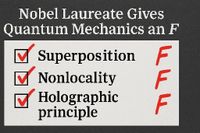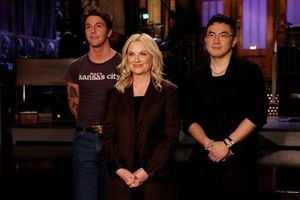In a bold assertion that challenges the very foundation of modern physics, Nobel Laureate Gerard ’t Hooft has declared that quantum mechanics is fundamentally flawed and impeding scientific progress. In an exclusive interview with Lee Billings for Scientific American, ’t Hooft expressed his dissatisfaction with the standard interpretation of quantum mechanics, asserting that it relies on misconceptions that hinder breakthroughs in understanding the universe.
According to ’t Hooft, the concept of superposition—where particles exist in multiple states until measured—is not a physical reality but merely a mathematical convenience. “I think the physical world itself is a very ordinary one that is completely classical,” he stated, emphasizing a need to return to deterministic models of particle behavior.
His views challenge the established norms of quantum physics, which has been celebrated for its accuracy in describing the behavior of particles at the smallest scales. Yet, ’t Hooft argues that reliance on quantum mechanics limits scientific progress, urging researchers to rethink core assumptions and explore alternative frameworks.
“Superpositions of states are not real,” he asserted. “If you look very carefully, things never superimpose.” This perspective puts him at odds with many in the quantum science community, especially those involved in the burgeoning fields of quantum information and computing, which heavily depend on the principles of superposition and entanglement.
While many physicists believe these quantum effects are crucial for advancements in technology, such as quantum computing, ’t Hooft contends that genuine progress will not come from refining quantum mechanics but rather from replacing it entirely. “What I’m saying is: we must unwind quantum mechanics, so to speak, as to see what happens underneath,” he explained.
His critiques are not merely theoretical. ’t Hooft pointed out that quantum computers frequently encounter errors, and efforts to correct these errors highlight a fundamental issue. “If you’re trying to correct these errors, what that means to me is: you want to go to more basic degrees of freedom that do not ever carry any error in them because they’re exact—they’re just classical,” he remarked, suggesting that a return to classical models may be key to overcoming current technological limitations.
In recent years, ’t Hooft has delved into more fundamental models of physical behavior that are rooted in determinism rather than probabilities. He uses the metaphor of a grandfather clock to illustrate his ideas, where a deterministic pendulum drives the movement of a clock hand. This analogy is intended to demonstrate that precise, clockwork-like systems could underlie what currently appears to be random behavior in the quantum realm.
Despite his groundbreaking ideas, the scientific community has largely remained unresponsive. “I got very few reactions to this,” ’t Hooft lamented. “I would have thought that people would say, ‘Oh, yes, of course. Now we understand how to continue!’ But instead, they’ve said, ‘Okay, right, ’t Hooft has another hot idea, another crazy idea.’”
His frustration extends beyond the reception of his theories; he also criticized the lack of creative risk-taking within the field of theoretical physics. With thousands of papers being published each year, he feels that few are asking genuinely new questions. “The real reason why there’s nothing new coming is that everybody’s thinking the same way!” he advised younger scientists, encouraging them to break from conventional thinking.
Yet, despite his critiques, ’t Hooft remains optimistic about the potential for new discoveries. He believes that reexamining core beliefs is essential for future breakthroughs. “If you believe right from the beginning that quantum mechanics is a theory that only gives you statistical answers and never anything better than that, then I think you’re on the wrong track,” he asserted.
He argues that scientists must take a step back from their current understanding to pave the way for deeper insights. This backward step, he posits, could eventually replace statistical quantum rules with deterministic ones, similar to how Newton described gravity.
Amidst his skepticism about quantum theory, ’t Hooft is particularly wary of how concepts like the holographic principle—an idea he helped pioneer—have been misinterpreted. He expressed concern that these ideas have been taken far from their original intent, leading to speculative theories about simulation universes and cosmic-scale computer programs. “Maybe I should have never talked about the holographic principle because, yes, some people are galloping away into nonsense,” he stated.
His call for a more grounded approach emphasizes clarity and logic, suggesting that beloved concepts in quantum mechanics may need to be abandoned. “Quantum mechanics is the possibility that you can consider superpositions of states. That’s really all there is to it,” he concluded.
Recently, ’t Hooft was honored with the $3 million Breakthrough Prize in Fundamental Physics, recognizing his lifetime of paradigm-shifting contributions. However, he shows no signs of resting on his laurels. For him, the next great advance in physics will not be achieved through larger machines or more complex mathematics but rather through a willingness to ask the questions that others have stopped considering.
“We should try not to be supernatural; if we, as scientists, only leave a wake of mysteries behind us, we’re not doing the right thing,” he emphasized, underscoring his commitment to clarity in scientific inquiry.
As the debate over the validity of quantum mechanics continues, ’t Hooft’s provocative insights challenge the scientific community to reconsider its foundational beliefs and explore new avenues of understanding. His insistence on returning to a deterministic view of the universe may not only reshape the future of physics but also redefine humanity's quest for knowledge in the cosmos.





